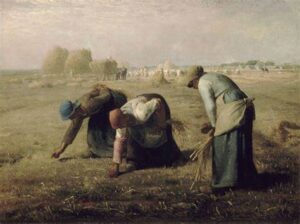Each year, we tend to recognize new words that come into our vocabulary. Often these words reflect trends in pop culture. They are hip, so to speak. What goes uncelebrated are words that have fallen out of use but should be very relevant today. One such word is gleaning.
Gleaning has early references in the Bible. In Deuteronomy and Leviticus, farmers are urged to leave parts of their fields unharvested or leave behind any part of the field that was not originally harvested. The remains are called gleanings. The admonition is that the gleanings can then provide sustenance for those less fortunate. Rabbinic literature from the Jewish faith had similar admonitions.
In Europe, gleaning was given legal status. Church bells were used to designate when gleaning could start and end. While gleaning was an established practice, it was one that remained hidden from the consciousness of the upper class.
In 1857, artist Jean-Francois Millet completed a painting called The Gleamers as shown below.
Millet presented his painting at the Salon, a government-sponsored exhibition of works of art to considerable negative criticism. French society was uncomfortable with the depiction of poverty. The three women stooped over picking up the remains of a wheat harvest was a painful reminder that not everyone was prospering.
The size of the painting, nearly 3-foot by 4-foot, was also criticized. That size of painting was normally reserved for religious images. For artists, gleaning became a popular theme for their paintings and this set a trend of art carrying with it a social message.
The act of gleaning remains with us today as a way to provide for those for whom food security is a matter of survival. Supermarkets and restaurants are encouraged to provide food that would go to waste to those who have limited resources for food volunteers also are provided access to fields to collect crops for food banks.
Just imagine why so few of us know the significance of the word gleaning. Is it that we don’t want to be reminded that there are those going hungry in our society? Or maybe we feel guilty about the food we have in our refrigerators and pantries going to waste. What might be the impact of artists in today’s society depicting children dumpster diving for food?
It’s time that gleaning becomes a word that is recognized by all as a call for developing a humanitarian culture.
* * *
“So she departed and went and gleaned in the field after the reapers – and she happened to come to the portion of the field belonging to Boaz, who was of the family of Elimelech.” – Ruth 2:3
